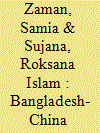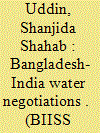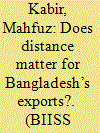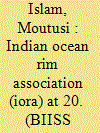|
|
|
Sort Order |
|
|
|
Items / Page
|
|
|
|
|
|
|
| Srl | Item |
| 1 |
ID:
159612


|
|
|
|
|
| Summary/Abstract |
The growing weight of China in terms of power and influence, defined either as a pole of attraction or as a pole of opposition, shapes the strategic environment of the Asia Pacific as well as the South Asian region. China has taken up its One Belt, One Road (OBOR) project, which is aimed at building trade and infrastructure network and ensuring access to trade and energy passage. It is both a development and diplomatic project for China focused on creating an economic and political sphere of influence not only in the region but also in the global context. Most countries in South Asia are engaged with this OBOR initiative. In this backdrop, Chinese President Xi Jinping visited Bangladesh in October 2016. During the visit, Bangladesh joined the OBOR initiative and both the countries pledged to upgrade their relations from the existing ‘closer comprehensive partnership’ to ‘strategic partnership’. In this respect, the main objectives of this paper are to understand the strategic partnership in the context of Bangladesh-China relations, to identify the factors shaping Bangladesh-China strategic partnership and to explore the implications of this partnership for both Bangladesh and China. The paper also elucidates its regional ramifications.
|
|
|
|
|
|
|
|
|
|
|
|
|
|
|
|
| 2 |
ID:
159611


|
|
|
|
|
| Summary/Abstract |
Sharing river water between neighbours is a complicated task as it creates upstream-downstream supply disputes. Having the highest number of common rivers with its biggest neighbour – India, Bangladesh has to face common water sharing disputes with that country. To resolve disputes over water sharing, Bangladesh started negotiations with India after its independence, but the country has been facing challenges in reaching a consensus on a formula and mechanism to share the common water. Given this backdrop, the present paper argues that the water negotiations between Bangladesh and India are being affected due to significant negotiation challenges which make the water negotiations a zero-sum game. With this argument, the paper endeavours to examine the challenges of Bangladesh-India water negotiations. To understand these challenges, this paper evaluates historical fact, past and ongoing water negotiations between Bangladesh and India. Some possible solutions are also suggested in the paper to overcome these challenges.
|
|
|
|
|
|
|
|
|
|
|
|
|
|
|
|
| 3 |
ID:
159610


|
|
|
|
|
| Summary/Abstract |
Geographical proximity plays an important role in international trade. The gravity model of modern trade theory reveals that the closer the two countries the greater the volume of their bilateral trade. Bangladesh’s export trade has demonstrated impressive performance over the last one and a half decades. The exports are still dependent heavily on Readymade Garments (RMGs) for which the major destinations are distantly located countries, which is opposite to the prediction of the gravity model. Geographical diversification in destination has become an important policy priority for the existing mix of export items in the current and recent past export policies of the country, which is supposed to reverse the current role of distance. Given this context, the present paper is an attempt to examine whether the direction of distance has changed in the country’s export with panel data econometric model. An export weighted distance index has been developed to reveal the relative change in economic geography of Bangladesh for its major export destinations. The empirical results reveal that the policy initiatives of geographical diversification have obtained mixed results, but they have not been significantly successful to reverse the direction of distance in exports.
|
|
|
|
|
|
|
|
|
|
|
|
|
|
|
|
| 4 |
ID:
159613


|
|
|
|
|
| Summary/Abstract |
The paper attempts to assess the performance of the Indian Ocean Rim Association (IORA) in the last 20 years since its birth in 1997 and foresees future challenges and opportunities for member states including Bangladesh. As a bridge between Asia and Europe, the Indian Ocean has become the new centre of global strategic and economic salience. IORA is the prime regional organisation devoted to the governance of this area. Despite its relative success, the potentials of IORA are believed to be remarkable. The organisation has provided a platform for cooperation in the areas of maritime safety and security, trade and investment facilitation, fisheries management, disaster risk management, academic, science and technology cooperation, tourism and cultural exchanges and blue economy, etc. Moreover, IORA has immense potential to become an effective regional forum, as observed in its 2017 Leaders’ Summit. However, the paper argues that vast area and diversity of the region, presence of numerous sub-regional and regional groupings, absence of influential leaders, exclusion of potential member states and lack of resources are some of the key challenges for IORA to become an effective regional organisation. At the end, the analysis exhibits some ways to strengthen IORA, i.e., increasing the role of major powers of the Indian Ocean littorals, creating a distinct identity, engaging the dialogue partners and greater grassroots involvement.
|
|
|
|
|
|
|
|
|
|
|
|
|
|
|
|
| 5 |
ID:
159614


|
|
|
|
|
| Summary/Abstract |
Russia, nowadays, vigorously displays its strength in global affairs, which it could not do after the fall of the Union of Soviet Socialist Republics (USSR). Vladimir Putin and Dmitry Medvedev made this possible by recovering the country’s former standing and equitable place in the world arena. The country’s reemergence has resulted in growing confrontations with the West. The Russo-Georgian War and the Ukraine Crisis deeply worsened Russia-West relations. There are other differences on, for instance, Syrian war, expansion of North Atlantic Treaty Organization (NATO) and Venezuela. The United States’ presidential election 2016 has also allegations of Russian meddling. Russia is now trying to form new alliances at regional and global levels, including expansion of relations with depressed Western allies to counterbalance Western preponderance. Albeit Russia and West both suffer from economic slump, their belligerent rhetoric and military postures go on where neither is willing to give up. Russian reassertion and Russia-West antagonism sometimes create fear of full-scale conflicts. This article examines the reemergence of post-USSR Russia under Putin and Medvedev, mutual perceptions of and interactions between Russia and the West, Russia’s role as a global player in recent times, and if Russia’s resurgence will create new conflicts. It is a qualitative research, drawing from secondary sources. It mainly argues that there are reasons both for and against conflict, but neither Russia nor the West can endure a real war.
|
|
|
|
|
|
|
|
|
|
|
|
|
|
|
|
|
|
|
|
|